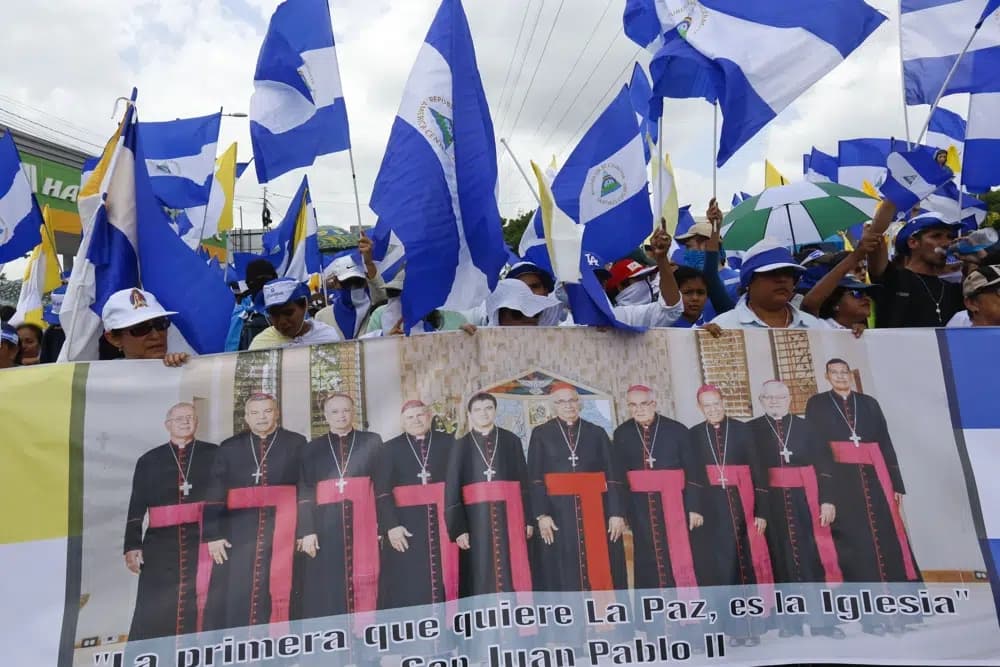NEW YORK – While acknowledging that overall conditions continue to deteriorate, a member of the federal commission that monitors religious freedom worldwide has expressed hope that the Trump administration will prioritize the issue.
“Our new Secretary of State [Marco Rubio] was a champion of international religious freedom when he was in the Senate, so I imagine when the dust settles at the State Department a little this will be a priority for him and that’s encouraging,” Maureen Ferguson, a commissioner with the United States Commission on International Religious Freedom told Crux on March 25.
Ferguson later added that “there does seem to be a recognition” of the importance of religious freedom from the Trump administration so far, noting also recent comments made by Vice President JD Vance that the administration will prioritize the issue.
USCIRF is an independent and bipartisan government body.
Ferguson made the comments ahead of the publication of the commission’s 2025 report on global religious freedom, which assesses the religious freedom policy of the Biden administration and global trends and developments in 2024, and recommends countries for the State Department to designate as Countries of Particular Concern (CPCs) because of their engagement in, or toleration of “particularly severe” religious freedom violations.
The 2025 report notes that the Biden administration did not issue new Countries of Particular Concern, Special Watch List, or Entities of Particular Concern designations in 2024 before the conclusion of the administration in January 2025, which is a violation of the International Religious Freedom Act.
“The Secretary of State Anthony J. Blinken did not issue CPC, SWL, or EPC designations by the end of 2024 or the conclusion of the administration in January 2025, thereby leaving 2023 designations in effect,” the report states. “Despite that failure to comply with IRFA in regard to those designations, the administration of then President Joseph R. Biden otherwise engaged in many initiatives supporting or advancing IRF as noted throughout this report.”
For 2025, based on religious freedom conditions over the last year, USCIRF recommends the current State Department redesignate 12 countries – Burma, China, Cuba, Eritrea, Iran, Nicaragua, North Korea, Pakistan, Russia, Saudi Arabia, Tajikistan, and Turkmenistan as Countries of Particular Concern.
The commission also recommends the State Department give four additional countries – Afghanistan, India, Nigeria, and Vietnam the designation. It also calls on the State Department to include 10 countries – Egypt, Indonesia, Iraq, Kazakhstan, Kyrgyzstan, Malaysia, Sri Lanka, Syria, Turkey, and Uzbekistan – on the Special Watch List.
“My overall takeaway is that the challenges are many,” Ferguson said of the religious freedom conditions worldwide. “There are hot spots all over the world, and conditions are deteriorating in most. … The general trend has been one of increased religious persecution.”
Ferguson said Nigeria is “the most dangerous place for a Christian in the world today,” citing the “constant reports of kidnappings and massacres and displacement.” A recent report found that 3,100 Christians were killed and 2,830 were kidnapped in Nigeria in 2024.
The conditions in Nigeria have deteriorated for years. USCIRF has recommended it get a Country of Particular Concern designation every year since 2009. The first Trump administration gave Nigeria the designation in 2020. However, a year later, Biden administration Secretary of State Anthony Blinken removed it, and it hasn’t been restored since.
“That is a spot where there’s room for the most improvement,” Ferguson said.
“In the previous Trump administration, they did agree with that designation, so it would be logical to hope that they would do so again because if anything conditions have only worsened there,” she noted.
Another country of concern to Christians, especially Catholics, is Nicaragua, which is where the report’s cover images were taken. The introduction of the report states: “Nicaragua’s Ortega-Murillo regime has increasingly sought to stifle dissent. It has harassed, arrested, tried, and deported numerous members of the Catholic clergy – leaders of the country’s largest religious community.”
One of the cover images in particular shows a nun standing inside the damaged Blood of Christ chapel after it was attacked with an incendiary device in 2020, which the Nicaraguan Bishops Conference called at the time an “act of terrorism.”
“The crackdown on religious freedom in Nicaragua has been fast and brutal,” Ferguson explained. “I think it’s an important example to look at because the Catholic Church and the infrastructure there has been such a social safety net, and culturally so integral.”
Broadly, USCIRF recommends in the report that the Trump administration take prompt actions that include filling a number of roles relevant to U.S. international religious freedom policy, including a special advisor to the president, ambassador at large, special envoy to combat antisemitism, as well as a special envoy for Nigeria and the Lake Chad Basin, among others.
The report also calls on the Trump administration to “swiftly” determine and announce designations, deepen the nation’s leadership on the international level, and resettle refugees who have fled countries with the most egregious forms of religious persecution.
“Now more than ever, U.S. support for the right to freedom of religion or belief must remain a priority as both a strategic national interest and a reflection of our national identity,” the report states.
Follow John Lavenburg on X: @johnlavenburg












